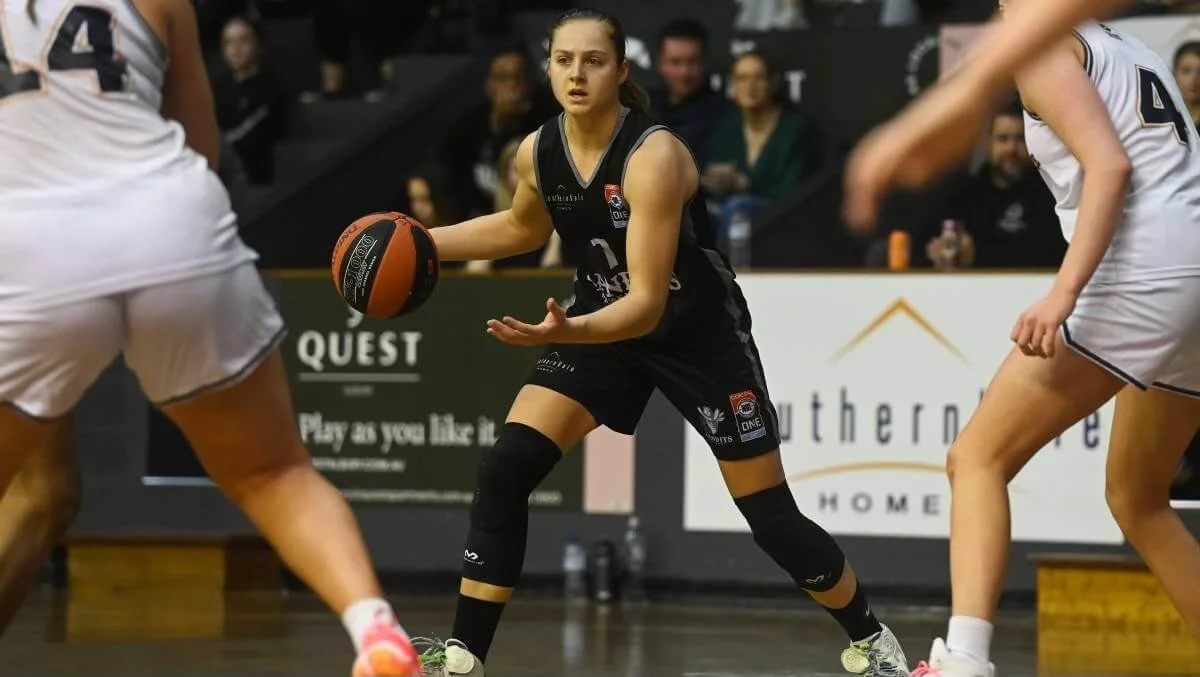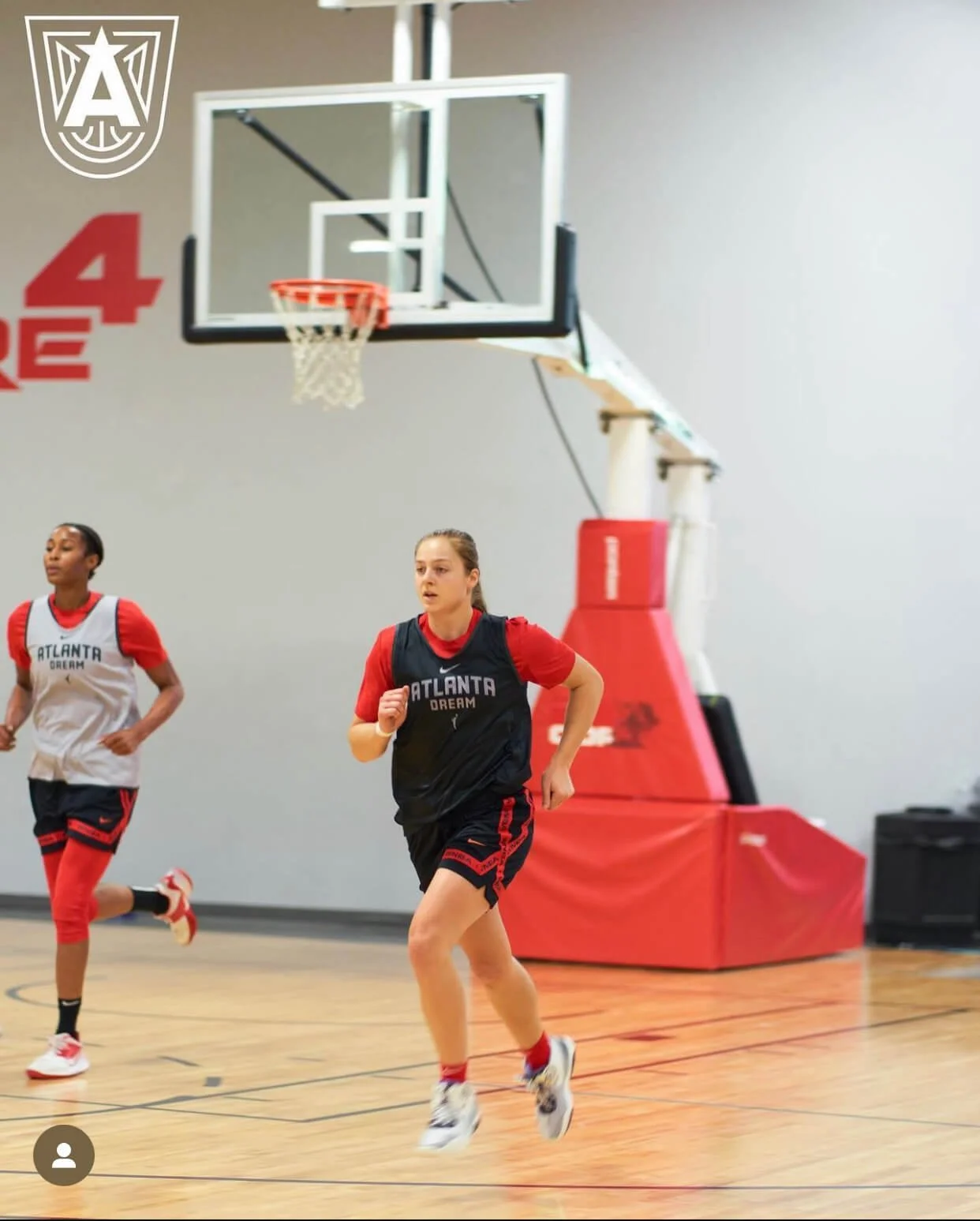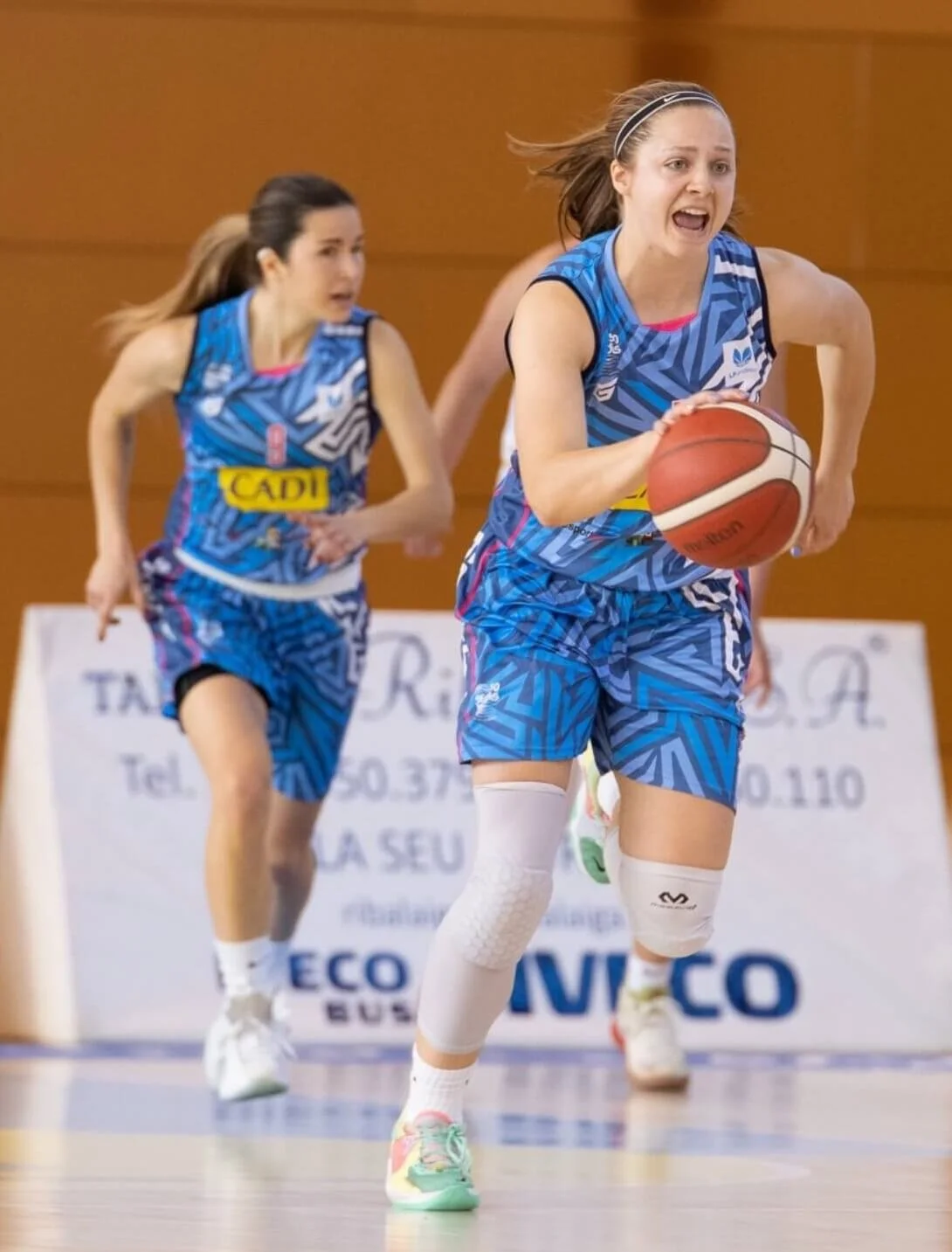For Mikayla Pivec, it has been around the world in 1,825 days
Mikayla Pivec, shown here playing for the Albury Wodonga Bandits in Australia, has embarked on a pro basketball “adventure” that has taken her to 11 teams and five countries in five years
Mikayla Pivec figured she was in for some extensive travel in professional basketball when she graduated from Oregon State in 2020 after a storied career with the Beavers.
Little did she know, however, that she would be making 12 stops to play for 11 teams in her first five pro seasons.
“Feels like mercenary work,” she says with a smile.
From Spain to Spain (again) to Puerto Rico to Turkey to Australia to Puerto Rico to Ireland (briefly) to Spain to Australia and Puerto Rico to Spain to Australia (whew), Pivec has seen the world, or at least a good part of it.
“I am thankful for all of (her pro stops), because getting to experience different cultures is amazing,” says Pivec, 27, who is living with sister Malia in Beaverton while recovering from knee surgery.
Mikayla has played just about everywhere except where she really wants to play: In the WNBA.
“That has been my dream since I was in high school,” says the Lynnwood, Wash., native, an All-Pac-12 performer and the conference’s Scholar-Athlete of the Year in women’s basketball as a senior at OSU in 2019-20.
Ironically, it was the Atlanta Dream that chose Pivec with the first pick in the third round — 25th overall — of the 2020 WNBA draft. Her timing was terrible. That was the Covid year, which caused cancellation of the team’s training camp. “I wasn’t going to make their roster without a tryout,” says Pivec, who negotiated an opt-out, which allowed the Dream to retain her rights.
Pivec was drafted by the Atlanta Dream in 2020 and attended their training camp in 2023 but never played for the WNBA team
Meanwhile, she had foot surgery that summer to repair an injury she had dealt with her senior year in Corvallis. Then in September 2020 she signed to play for Club Deportivo Promete in Spain’s First Division. It was not a fun rookie season. Pivec averaged 5.1 points, 3.0 rebounds and 15 minutes in 16 games before leaving in midseason for home before Christmas.
“The team went into lockout (due to Covid),” she says. “I had no roommates. I was going crazy. All the restaurants were shut down. I was an essential worker, so I was able to go to and from the gym. One day, I went outside to dribble in the street. Police stopped me, asked for my passport and told me to go inside. I had to sit in my room and twiddle my thumbs until practice the next day.”
Pivec says a teammate, who acted as translator between her and the coach, gave her bad information to intentionally create friction between her and the coach.
“It wasn’t a good team environment,” she says. “I am very team-oriented and it was a rude awakening to the very individual, can-be-toxic professional system.”
Shortly after returning to Oregon, Pivec had surgery to repair a torn meniscus in her left knee. Shortly thereafter, she was notified that the Dream was releasing her.
“They didn’t even invite me to training camp, which wasn’t a big ‘ask,’ ” Pivec says. “That hurt.”
Fully healed by late April, Pivec was invited to the training camp of the WNBA’s Minnesota Lynx. She played well but was one of the team’s last two cuts.
In late 2021, she returned to Spain to play for another pro team, Cadi la Seu. It was a much more pleasurable experience for Pivec, who started at shooting guard and averaged 9.6 points and 5.5 rebounds in 30 games for a team that reached the semifinals of the First Division.
Mikayla had a good run with Cadi la Seu in Spain in 2021, starting at shooting guard for a team that reached the semifinals of the First Division
“I had a great year, enjoyed my coach and teammates, and our team overachieved,” Pivec says.
During the playoffs that season, she was invited to training camp with the WNBA’s Connecticut Sun but turned it down.
“It would have been a great opportunity,” she says. “But I would have had to leave during the playoffs, and I didn’t want to do that to my team.”
Her next stop was with a team called Montenegro de Morovis in Puerto Rico, where she spent three months playing with Oregon State teammate Kat Tudor. Mikayla was among the league leaders in assists.
“We were freshman roommates at OSU,” Pivec says. “It was cool to see how both of us have grown. Kat started her college career like a party girl, having a good time, not super-structured; I started on the other end of the spectrum, hyper-structured. We have both moved to the middle in a lot of ways. It was fun to have her there — really helpful to me.”
Then it was on to Turkey, where she played for a team called Olodag. After that, the Dream came calling again, and she took part in their training camp in April 2023.
“I was not happy with my previous experience (with the Dream), but training camp is a cool opportunity, and they had a different coach (Tanisha Wright), different management.”
Alas, Pivec was cut.
“I was really disappointed,” she says. “I felt great about how I prepared and how I performed in camp. I guess I just wasn’t what they were looking for.”
From there it was on to three months in Australia, where she was a major force for the Albury Wodonga Bandits, averaging 18.9 points, 12.3 rebounds and 7.7 assists in 12 games. Next was another stint in Puerto Rico and three games for a pro team in Ireland in an attempt to gain her Irish passport. Grandparents on her father’s side were from Ireland, but there were a couple of motives.
Pivec, shown here in a Santurce jersey, has had three stints playing with teams in Puerto Rico
“If you have an Irish passport playing in Europe you are a lot more valuable — you don’t have to qualify as an export,” she says. “The teams in the best leagues have a limit of two Americans. If you can count as a European, you have better chance to play there. Also, I could be a member of the Irish national team, which would be a big honor.”
Pivec visited with coaches and some politicians during her stay in Ireland in the fall of 2023. She is hopeful her petition for Irish citizenship will come soon enough to allow her to play for the country in international competition next February.
From December of ’23 to March of ’24, Pivec played for Casademont Zaragoza in Spain, getting in only 11 games and playing sparingly.
“It was the first team I got fired from,” she says. “I was a two/three, and they wanted to bring in a point guard to fill the second American spot. The team was doing well. They were making a big push and I was expendable because they were going to invest big money in a different position. Their position to me was, ‘Sorry, we like you, but we have enough depth at your position.’
“That didn’t feel good. I tried to maintain confidence in what I bring to the table, but I felt like I wasn’t being valued. I am not a big scorer. I focus on the attributes I bring, like being a great teammate, a good rebounder, defender and playmaker. If a team values only scoring, that’s not me.”
From April to August 2024, Pivec had another successful run with the Bandits in Australia, nearly averaging a triple-double (17.7 points, 10.8 rebounds, 9.9 assists) in 22 games. The Bandits won the NBL East regular-season title and she was named to the conference All-Star first team. Little surprise that they have been her favorite pro team to play for thus far, in no small part to getting to play with eventual Hall of Famer Lauren Jackson. In the final season of her distinguished career at age 43, the 6-5 Australian native had games of 43 points and 22 rebounds and 50 points and 19 boards.
“I grew up watching Lauren and Sue Bird playing with the (WNBA) Seattle Storm,” Mikayla says. “Playing with Lauren in her last year was just great. I really liked my teammates there, too. With some teams, the players are either older or have kids. With (the Bandits) there were several players around my age who I could hang out with.”
After a month in Puerto Rico, Pivec returned to Spain to play with a team called Gernika KESB in late 2024. It didn’t last long.
“I ended up leaving after about a month, because they weren’t paying me,” she says. “They had financial issues and the head coach had gotten into some personal trouble, and sponsors started to pull out. The team knew what was happening but had covered it up. They stopped paying us.”
Her final stop this summer in a return to Australia to play with the Bendigo Braves was productive — 14.8 points, 8.4 rebounds, 4.8 assists in nine games. But her season was curtailed by a knee injury sustained in July.
“I got tackled (in a game) and hurt my right knee, which was my good knee,” Pivec says. “I had meniscus and loose cartilage surgery on July 23 in Melbourne. I am in good hands. The team went above and beyond in allowing me to stay there after the season and checking up on me. They proved to be a good organization with how they treated me.”
Three months into post-op, Pivec is swimming, biking and doing minimal upper-body strength work. It is another few weeks before she is able to return to the court for basketball activities.
“It should be a six-to-seven-month full recovery,” she says.
Though there have been many ups and downs through her pro career, Pivec considers it a net positive.
“Playing overseas has been an adventure for me,” she says. “There are times when it feels isolating being so far from home, especially when I am living in a country (whose inhabitants) don’t speak English. I miss the simple things, like being able to go to a coffee shop and crack a joke with the barista. And being gone so much, I have missed my fair share of birthdays, holidays and even weddings of teammates like Janessa Thropay and Katie McWilliams that I so badly wanted to attend.
“I do love what I do, and it is even better when I am on teams that make me love showing up to work every day. Not every team is like that, but the special ones remind you of what it is supposed to be like. I love playing basketball, learning about the game and learning about myself through it. I have met most of my best friends playing this wonderful sport.”
► ◄
Mikayla is co-founder and head of women’s basketball for the fledgling United College Athletes Association, with a goal to help found a college players union
There is an additional venture in Pivec’s professional life. Since 2022, she has been working mostly behind the scenes in helping form the United College Athletes Association, a nonprofit 501(c) (3) organization independent from the NCAA that for now is dedicated to college women’s basketball. Andrew Cooper, a Seattle-based former cross country and track and field athlete at Washington State and California, is executive director. Mikayla serves as head of women’s basketball.
“I am focusing on college women’s basketball now, but we hope to expand to all college athletics, because there is more power in being united rather than divided,” she says.
UCAA’s mission is to provide a forum to support college athletes and become a vehicle for them to stand up for their rights. Former WNBA player Layshia Clarendon, who played 11 years in the league after a college career at California, is on record as saying she hopes this leads to unionization.
“I agree with Layshia,” Pivec says. “My personal opinion is the future needs to be with collective bargaining (between colleges and athletes). We need to have a union.”
Pivec says college sports are at a chaotic stage now, brought on by the break-up of conferences, NIL and the transfer portal.
“We need some stability for athletes,” Pivec says. “The only way to get there is (establishment of) a collective bargaining agreement. Let’s acknowledge the reality: College sports is clearly a business. We are no longer in a world where there is an educational focus. We have destroyed conferences that promoted regionality.
“Athletes deserve to be equal partners in the business, to have a say in its structure. In my opinion, unionization is the way to get there. There are a lot of schools that don’t want that to happen, but we need salary caps, transfer restrictions and contracts for both sides.”
(I have written in the past that all three entities are a necessity for there to be any sanity in the future of Division I college athletics.)
Over the past three years, Pivec and Cooper have engaged with more than 200 college women’s basketball players via social media and telephone conversations.
“We have talked to them about their experiences, how they have been treated, what kind of things they believe should be done on their behalf (at the Division I level),” Pivec says. “A lot of them aren’t aware of what is happening in Congress, what has been voted on their behalf, that revenue sharing has started, and how much schools are allowed to pay. They only know what (coaches and administrators) at their schools (are) telling them.”
Earlier this year, the UCAA sent a letter backed by 120 signatures of current and former women’s college basketball players to the commissioners of the Big Ten and SEC.
“We wrote it up, got the athletes’ feedback and sent it in,” Pivec says. “It stressed that (college women’s basketball) is a big business and that they deserve a voice, to have a safe working environment and standard protections at their schools. (Big Ten and SEC administrators) refused a simple meeting. The message was, ‘We can’t help you.’ ”
The UCAA isn’t giving up. Pivec and Cooper have assembled a team of advisors who are either current or former WNBA players, including Elizabeth Williams, an 11-year WNBA veteran currently playing for the Chicago Sky. Williams, who played at Duke, has taken a leadership role in providing direction for Pivec and Cooper.
“It is going to be about mobilizing, seeing what the athletes want to do and helping them understand what is going on,” Pivec says. “We can advise them, but we are making sure they are the ones making the decisions. That has been our mission from the start.
“We will continue to build the non-profit, to help players have a voice in this business, help them feel supported and organized in their power together. We want to put them in the best place for success as possible.”
► ◄
NIL has at least given college women’s basketball players a means for additional compensation beyond scholarship and monthly stipend funding.
“It is strange how much money college athletes are getting now,” Pivec says. “I think back to five years ago and my last season at Oregon State, when I couldn’t get a $5 cup of coffee from a donor without jeopardizing my eligibility. It seemed so backwards. The year after I graduated, (NIL) started. That’s frustrating.”
Pivec hasn’t gotten rich from pro basketball, either. Through five years, she figures her “financial takeaway” in salaries post-tax is $123,000, which doesn’t include housing, car and utilities costs covered by the teams. After each season when she returns home to Oregon, Mikayla has taken jobs to supplement her income in industries such as solar panel construction, beverage, technology, accounting, car repair and even science and reading tutoring of young girls.
For now, Pivec is concentrating on getting her body healthy for another crack at the WNBA. With two expansion teams entering in 2026 — including the Portland Fire — there will be 24 more roster spots to fill.
“I want to see my basketball (playing) career through,” she says. “I feel like there are still questions to answer about how good I can be. A basketball player’s prime years are from 28 to 32. If I am 30 and there are no doors open, it might be time to move on to my next career.”
That won’t be in coaching, at least at the college level.
“You have to sacrifice a ton of family time,” she says. “I am not opposed to coaching at the youth or high school level, maybe coaching my kids one day.”
Pivec has a pre-med background at OSU, with a bachelor’s degree in biohealth sciences and a master’s in biochemistry and biophysics. Her GPA as an undergrad: 3.93. “I spent too much time in the library,” she quips.
“There is still part of me that thinks there may be something for me in the medical field,” she says. “And I am fascinated by AI.”
That’s for the future. What is immediately ahead is more pro ball, and perhaps her first dose of what the WNBA is about from the inside.
► ◄
Readers: what are your thoughts? I would love to hear them in the comments below. On the comments entry screen, only your name is required, your email address and website are optional, and may be left blank.
Follow me on X (formerly Twitter).
Like me on Facebook.
Find me on Instagram.





